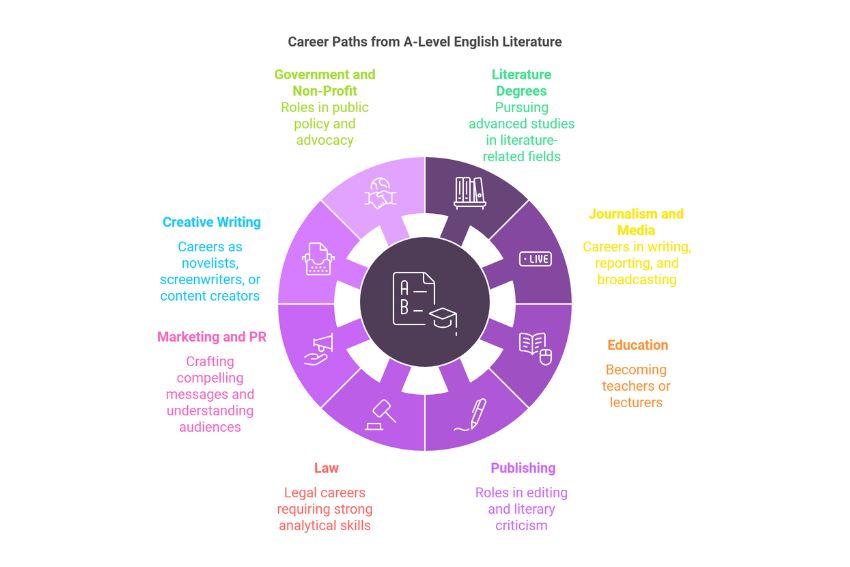A-Level English Literature – Complete Guide
A-Level English Literature is an exciting and thought-provoking subject. It involves exploring a wide range of literary works, including novels, plays, poems, and sometimes non-fiction texts. These works span different time periods, cultures, and genres. Naturally, many students ask themselves, “Is A Level English Literature hard?” and it’s a fair question. The subject goes far beyond just reading and understanding content, it encourages students to dig into deeper meanings, historical contexts, and the lasting impact these texts have on readers.
This subject is often considered one of the most rewarding A-levels. Moreover, it provides students with a deeper understanding of human nature and society. By engaging with complex ideas and emotions, students not only enhance their analytical skills but also develop the ability to view the world from diverse perspectives. English Literature fosters clear and persuasive expression, both in writing and speaking, while helping students appreciate the nuances of language and storytelling.
English Literature is invaluable because it enhances critical thinking skills while nurturing creativity. It examines how literature both reflects and influences society. Students analyse and critique texts that have significantly shaped culture and history. This makes the subject highly relevant, not just academically but also in preparing students for real-world careers. Many professions such as communication, law, education, and media demand the ability to analyse, interpret, and articulate ideas effectively. A-Level English Literature equips students with these essential skills.
The A-Level syllabus emphasises key themes like love, conflict, social issues, and identity. It includes a diverse selection of texts from different eras, such as Shakespearean plays, Victorian novels, and contemporary works. This variety exposes students to a range of writing styles and perspectives, enriching their understanding of language and literature. Studying English Literature also cultivates empathy. By examining different characters and situations, students gain insights into seeing the world through others’ eyes.

Why Choose A-Level English Literature?
Benefits for University Admissions and Career Prospects
Choosing A-Level English Literature can give your university application a real boost. It’s a respected subject, valued by top universities. The skills you learn such as critical thinking, analysis, and clear communication are highly sought after. A strong grade in English Literature can make you stand out, especially if you want to study law, journalism, history, education, or even medicine. These fields all require good communication and the ability to think critically.
Additionally, English Literature teaches valuable skills that apply to many careers. Furthermore, Being able to analyse complex ideas, consider different viewpoints, and present strong arguments is essential in industries like publishing, media, law, business, and politics. Many jobs require you to engage with texts, understand their context, and communicate ideas clearly skills you’ll develop in A-Level English Literature.
Personal Development and Critical Thinking Enhancement
A-Level English Literature is about more than just reading. It’s a chance to grow as a person. The subject encourages you to think critically, look at situations from different angles, and engage with tough ideas. By reading a wide range of texts, you’ll explore different cultures, time periods, and viewpoints. This broadens your mind and helps you become more open-minded and empathetic.
Critical thinking is one of the most important skills you’ll develop. You’ll learn to evaluate arguments, connect ideas, and question assumptions. These skills are not only useful for exams but in everyday life too. English Literature also boosts creativity. You’ll explore how authors use language, structure, and themes to tell their stories, all of which tie closely into the art of language analysis, a core skill for success in both English Literature and English Language A Level.
In short, A-Level English Literature opens doors to university and career opportunities. It helps you grow intellectually and personally, equipping you with the critical thinking and communication skills that will benefit you throughout your life. Whether you’re aiming for higher education or looking to develop key life skills, A-Level English Literature provides a strong foundation.
Understanding the A-Level English Literature Syllabus
A-Level English Literature offers an engaging and diverse syllabus, designed to develop critical reading, analytical, and writing skills. While the structure varies slightly across exam boards like AQA, Edexcel, and OCR, the core components remain consistent: Poetry, Prose, and Drama. Here’s a breakdown of what each exam board typically includes and the structure of the coursework and examinations.

Breakdown of Major Exam Boards
- AQA
AQA focuses on connecting texts through themes, genres, or historical periods. The syllabus includes:- Paper 1: Love Through the Ages (Shakespeare, poetry, and prose).
- Paper 2: Texts in Shared Contexts (modern literature or works from 1945 onwards).
- Coursework: A comparative essay analysing two texts, one of which can be a free choice.
- Edexcel
Edexcel emphasises close reading and contextual analysis. Key features include:- P1: Drama (Shakespeare and one other play).
- P2: Prose (two texts linked by a theme, such as childhood or crime).
- P3: Poetry (a selection of post-2000 poems and a pre-1900 collection).
- Coursework: An independent comparative study of two texts.
- OCR
OCR encourages a balance of classic and contemporary literature. The syllabus includes:- Component 1: Drama and Poetry pre-1900 (Shakespeare and a poetry text).
- Component 2: Comparative and Contextual Study (themes like the Gothic or dystopia).
- Coursework: Two essays focusing on independent study of chosen texts.
Core Components: Poetry, Prose, and Drama
- Poetry
Poetry explores themes, styles, and historical contexts. Students analyse works ranging from classic poets like John Donne or Christina Rossetti to modern voices like Carol Ann Duffy or Simon Armitage. Close reading and understanding poetic techniques are essential skills. - Prose
Prose includes novels and short stories from different periods. Students study texts that explore themes such as love, identity, power, and conflict. These may include Victorian classics like Jane Eyre or modern works like The Handmaid’s Tale. - Drama
Drama focuses on plays, with an emphasis on Shakespeare as a cornerstone. Students may also study modern playwrights like Tennessee Williams or Arthur Miller. The aim is to analyse language, themes, and how the plays are performed on stage.
Coursework and Examination Structure
- Coursework
It allows students to delve deeper into literature. They independently select texts, often focusing on comparative analysis. This element encourages originality and critical thinking, making up around 20% of the overall grade. - Examinations
The exams are structured to test understanding, analysis, and comparison.- Paper 1: Focuses on specific themes or time periods. Students analyse and compare texts while demonstrating contextual knowledge.
- Paper 2: Often includes unseen texts, requiring students to apply analytical skills to new material.
Preparing for Exams
Success in A-Level English Literature requires thorough preparation, effective strategies, and a calm mindset. To excel, it’s essential to manage your time, practice with past papers, and handle exam stress with care.
Time management is the foundation of good preparation. Start by creating a study plan that breaks your revision into manageable sections. Allocate specific times to focus on individual texts, themes, or techniques. For example, dedicate one week to analysing Shakespeare’s plays and another to poetry. Set daily goals to keep yourself on track, such as writing an essay or reviewing two chapters of a novel. Avoid cramming; instead, spread your revision across weeks or months for better retention.
Practising with past papers is one of the most effective ways to prepare. Familiarise yourself with the exam format and question types by completing past papers under timed conditions. This will help you pace yourself during the actual exam. Once finished, compare your responses with the mark schemes to understand what examiners expect. Pay attention to assessment objectives, such as analysis, argument structure, and the use of context. Asking teachers or peers for feedback on your essays can also help you identify areas for improvement and refine your skills.
Handling exam stress is just as important as studying. Staying organised reduces anxiety, so keep your notes and materials in one place. Regular breaks during revision can boost focus and prevent burnout; even a short walk or stretching can make a big difference. To manage stress, practise relaxation techniques like deep breathing or mindfulness exercises. Staying healthy is equally vital eat balanced meals, drink plenty of water, and prioritise sleep. A well-rested mind is more effective than an exhausted one.
Career Paths with A-Level English Literature
Studying A-Level English Literature opens doors to a wide range of university courses, degrees, and career opportunities. The subject equips students with valuable transferable skills that are highly regarded in many professional fields.
Potential University Courses and Degrees
A-Level English Literature is a respected qualification that can lead to various university degrees. Many students pursue degrees in English Literature, Creative Writing, or Comparative Literature. These courses allow for deeper exploration of texts, themes, and literary theories.
Beyond literature-specific degrees, English Literature is a strong foundation for related fields such as Journalism, Media Studies, Film Studies, and Drama. The analytical and communication skills developed in this subject are also valuable for degrees in Law, History, Philosophy, and Education. Additionally, interdisciplinary courses like English and Psychology or English and Business are popular choices, offering students a chance to combine their literary expertise with other interests.

Conclusion
A-Level English Literature is a subject that inspires critical thinking, creativity, and a deeper understanding of the world. It equips students with valuable skills for both academic success and future careers. For prospective students, it’s an opportunity to explore powerful texts, engage with important themes, and develop a lasting appreciation for literature.
If you’re looking for personalised guidance, Edumentors offers expert tutors from top UK universities to help you excel in A-Level English Literature. Embrace the challenge, and you’ll gain skills and insights that will benefit you for life.
FAQs
What does the A-Level English Literature course involve?
The course entails studying a variety of texts, including poetry, prose, and drama, from different periods and genres. Students analyse themes, characters, and literary techniques, and explore the historical and cultural contexts of the works. The curriculum typically includes both examined components and coursework.
How can I effectively prepare for A-Level English Literature exams?
Effective preparation involves creating a comprehensive study schedule, focusing on key themes, motifs, and literary techniques in each work. Practising essay writing on sample questions, exploring different interpretations and critical perspectives, and making concise summary notes or flashcards for each text are beneficial strategies. Additionally, understanding the historical and social contexts of the literature can deepen your analysis.
What skills are developed through studying A-Level English Literature?
Studying this subject enhances critical thinking, analytical abilities, and effective communication skills. Students learn to construct coherent arguments, interpret complex texts, and appreciate diverse perspectives. These skills are transferable to various academic disciplines and careers.
What career opportunities can A-Level English Literature lead to?
This qualification can lead to careers in journalism, education, publishing, law, marketing, public relations, and more. The analytical and communication skills gained are valuable in many professional fields.
How is A-Level English Literature assessed?
Assessment typically includes a combination of written examinations and coursework. Exams may involve essay-based questions analysing specific texts or themes, while coursework often requires independent critical studies or comparative essays.
What are some effective revision techniques for memorising quotes and literary references?
Creating a quote bank or flashcards with key quotes from each text, organised by theme, character, or context, can be helpful. Incorporating these quotes into practice essays and responses to exam questions, and using mnemonic devices or associations to remember challenging quotes, are effective strategies.
Is A-Level English Literature considered a difficult subject?
A-Level English Literature is perceived as challenging due to the analytical skills and extensive reading required. However, with dedication and effective study techniques, students can succeed and find the subject rewarding.








